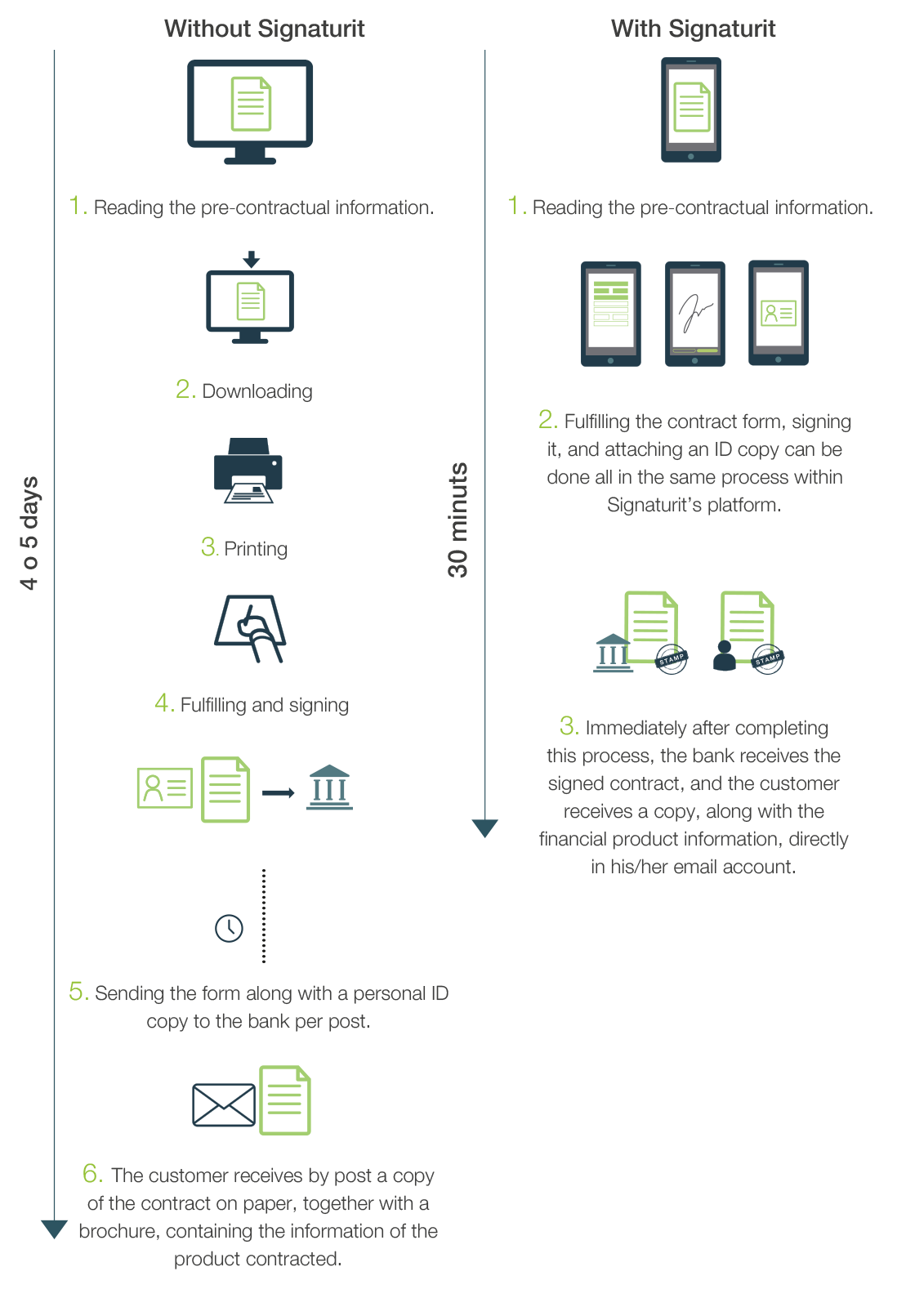Table of contents
In a previous post, we discussed the advent of contextual banking and the need for financial entities to adapt to the digital client’s preference for mobile banking services. It has become crucial for banks to offer products and services in a way that complements the client’s daily routine, as and when the client needs them.
One tool that banks can use to access and build trust with the digital generation is the electronic signature. This tool allows clients to access the financial products and services they need on the go without involving paperwork or the need to be physically present at a branch to sign documents.
In this post, we list the advantages of electronic signatures for banks and take a look how the the presence of eSignatures affects work flow.
Primary advantages of eSignatures for banks
1. Improved product sales times and financial services
If banks adopt eSignatures, they eliminate the need to print and send documents by post for clients to sign, significantly reducing the selling time of both their products and financial services.
eSignatures come into their own for simple transactions such as opening a new bank account. They allow clients to do so from the comfort of their own computer or mobile phone, wherever they happen to be, and without needing to sign any paper documents. Bank accounts can be opened in minutes, instead of days.
As clients tend to prefer a more personalised and attentive service when being sold more complex products, it is more likely that they would actually visit the branch in person. If their bank uses eSignatures and has equipped its branches with tablets, selling a client a loan could take place on the very same day that the client visits the branch. Using an eSignature allows clients to sign any type of documentation using a tablet as well as instantly receive a signed copy of a contract by email.
Online Banking1 |
Branch2 |
|
|
1. eSignatures allow these transactions to take place online.
2. Option to sign documents from a tablet at the branch.
2. Improved customer experience: immediacy, speed and mobility.
In today’s day and age, very few clients would ever choose to print, sign and scan documents at home before sending them back to the bank by mail or worse, by post. It is a tedious process that sees banks losing out, since efficiency is a factor that clients bear in mind when choosing a bank for their financial needs.
The speed and immediacy achieved by completing transactions with an eSignature tool are two highly valued characteristics for the digital client who is accustomed to results that take no longer than a click. It is therefore key to improve the client’s banking experience by offering the option of using an eSignature tool to sign documents, since they can do so from any device, at any time or place, without compromising data security and remaining compliant with the law.
EXAMPLE: regular process of opening a bank account, a credit card or a fixed-term deposit for a new client.

3. Improved effectiveness of offices and employee productivity
Providing employees with a tool such as the eSignature allows the flexible and efficient processing of any financial product or service that requires an authenticating signature, such as the opening a bank account or an application for a loan.
By saving time on administrative tasks, banks can invest more time in offering highly personalised service to customers, building bonds of trust and inspiring loyalty. Bank employees will feel more fulfilled in their roles as they will able to devote more of their time to tasks that add value to their profession, such as imparting knowledge and building customer loyalty, instead of losing time to administrative tasks.
4. Errors are eliminated during the signing process
Using an eSignature tool eliminates the possibility of errors or time losses that could otherwise occur through a failure to complete official documentation correctly. eSignatures serve as a guide for clients completing online documents, as the form will not send if all required fields have not been filled and signed on the pages as specified by the bank.
The electronic signature is a fundamental aspect of a bank’s digitisation. It markedly improves the customer’s banking experience and builds trust. To learn more about how Signaturit can help digitise and automate your business’s authentication processes, please download the whitepaper below.
RELATED POSTS




